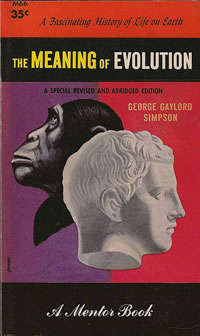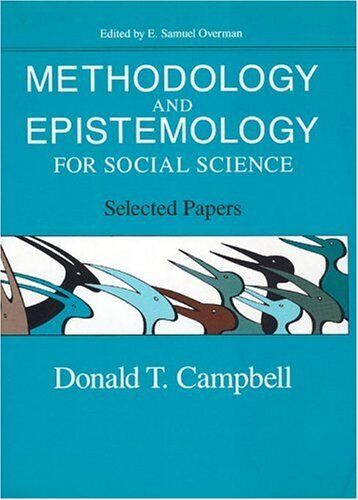Professor of Anthropology, 1964–1995
The Meaning of Evolution: A Study of the History of Life and its Significance for Man (1949), by George Gaylord Simpson (1902-1984). While in the U.S. Army during the Korean War, I was awaiting a bus on a winter afternoon in Washington, D.C. I stepped into a drugstore to wait. Simpson’s book was among the paperbacks I spotted on the stand there. With a high school education and the idea that evolution was a contentious subject, I thought the title presumptuous. So I bought the book in order to argue with it. After about 50 pages, Simpson had me convinced, he had me excited, and I now knew what I wanted to study when I left the Army and went to college. I majored in anthropology as an undergraduate and then went on to graduate study in the same discipline. Many years later, I discovered that Simpson did his writing longhand and seldom crossed out a line.
“Descriptive Epistemology: Psychological, Sociological, and Evolutionary” [pp. 435-486, in Methodology and Epistemology for Social Science: Selected Papers, by Donald T. Campbell (1916-1996)]. For me, Donald Campbell’s article represents the best fifty pages ever written about what the behavioral sciences are trying to accomplish, and how they do it. With a (behavioral) Darwinian, post-positivist slant, Campbell outlines a blind variation-selection-retention model that has been applied beyond biology to scientific development, trial-and-error learning, personality, the study of genius, the evolution of sociocultural complexity, and the development of the behavior sciences themselves. Campbell does assert that “we are cousins to the amoeba, and have received no direct revelations not shared with it,” but he makes a careful, cautious case for our past and continuing progress in knowledge about human behavior. Despite my great enthusiasm about Campbell’s article, however, I learned to my disappointment that his essay, for all it meant to me, did not find favor among my undergraduates. Which means that I never did find a student to whom I could say, “Yes, and you should read his ‘Evolutionary Epistemology’ too!”
 The Meaning of Evolution: A Study of the History of Life and its Significance for Man (1949), by George Gaylord Simpson
The Meaning of Evolution: A Study of the History of Life and its Significance for Man (1949), by George Gaylord Simpson
 Methodology and Epistemology for Social Science: Selected Papers by Donald T. Campbell
Methodology and Epistemology for Social Science: Selected Papers by Donald T. Campbell